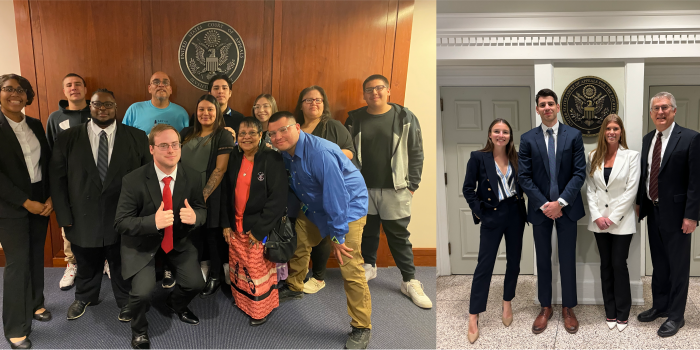Class of 2024 Graduates Argue in Federal Circuits

Two members of the Class of 2024 argued in federal circuits this past semester, as part of the Appellate Advocacy Clinic directed by Professor John Korzen (’91). Both argued in appeals in which the courts had appointed the Clinic to represent indigent individuals.
On May 14, Donny Stewart (JD ’24) argued to a panel of three judges in the Seventh Circuit, in Chicago, in the case of United States v. Duane Waupoose. Professor Korzen and Donny’s clinic teammates, AJ Fitzgerald (JD ’24) and Taylor Gibbs (JD ’24), joined him in court and sat at counsel table, and Taylor even passed Donny a helpful note while counsel for the other side argued. The case is on appeal from a three-count conviction that arose on a Native American reservation in the Eastern District of Wisconsin. The Clinic’s client, Duane Waupoose, was convicted of voluntary manslaughter, assault with a deadly weapon, and use of a firearm, after he fought back against a gang leader who arrived at his home shortly before midnight on the day in question with several other armed individuals.
One issue on appeal is whether the trial court erred by not allowing the jury to decide whether he acted in self-defense. If the appellate agrees with the Clinic’s position, then Mr. Waupoose’s conviction should be vacated, and he should receive a new trial. Nine members of his family attended the oral argument, driving four hours one way from Wisconsin to be there.
“Donny did an outstanding job in his argument,” Professor Korzen said afterwards, “and the entire team did great work researching and drafting two briefs. The judges had only a single question about the self-defense issue, and Donny seemed to address it fully and persuasively.”
On March 22, Spencer Osborne (JD ’24) argued to a panel of three judges in the Fourth Circuit, in Richmond, Virginia, in the case of Henderson v. Harmon. His clinic teammates Alexis Parker (JD ’24) and Jenna White (JD ’24), along with Professor Korzen, attended the oral argument. In Henderson, a Virginia inmate contends that his due process rights were violated when his appeal of a prison infraction and financial penalty was not decided for nearly six years. The Fourth Circuit recently decided the appeal against him, holding that the violation was harmless error under the circumstances, but also establishing an important principle.
“The Fourth Circuit held, for the first time in a published opinion, that an inmate has a protected property interest in his prison bank account, which makes ‘good law’ for future claims by inmates that officials are violating their rights,” Professor Korzen said. “Spencer made a great argument and thoughtfully handled many questions from a ‘hot bench,’” he added. “The judges praised his work when they greeted us after the argument, which is a unique Fourth Circuit tradition. Alexis and Jenna did excellent work on the two briefs we filed, too. Along with Spencer, they made clear arguments out of some very complex constitutional doctrine.”
Categories: Our People, Our Stories